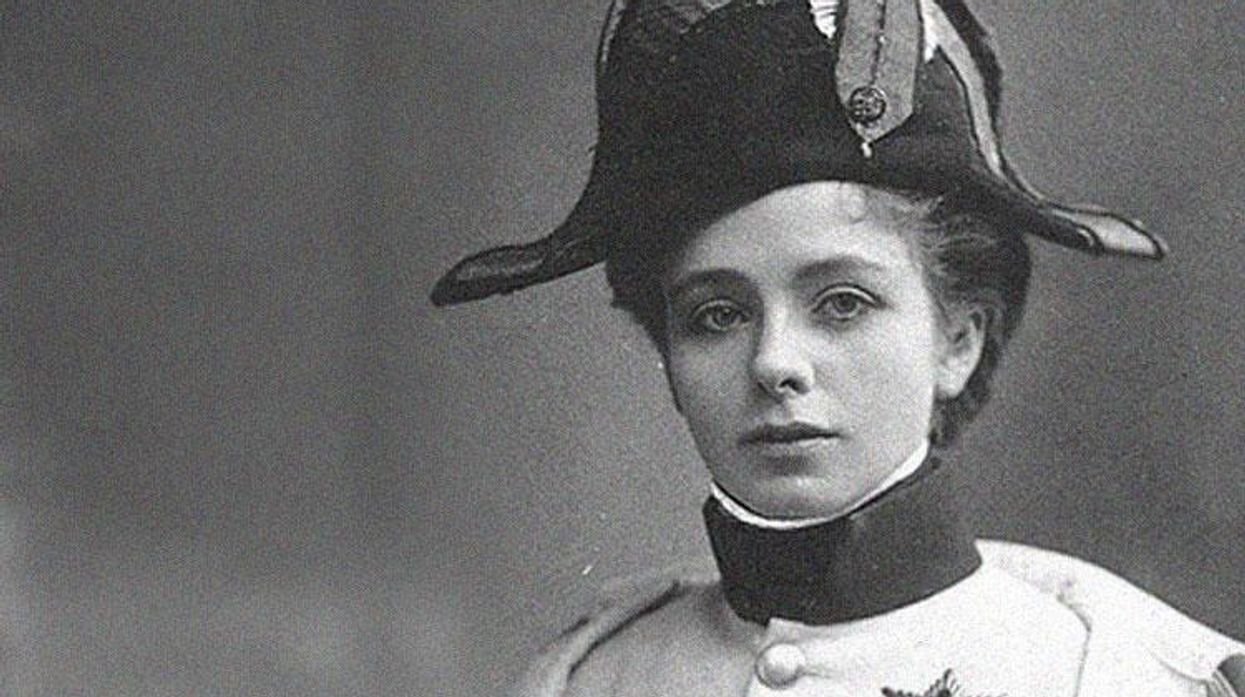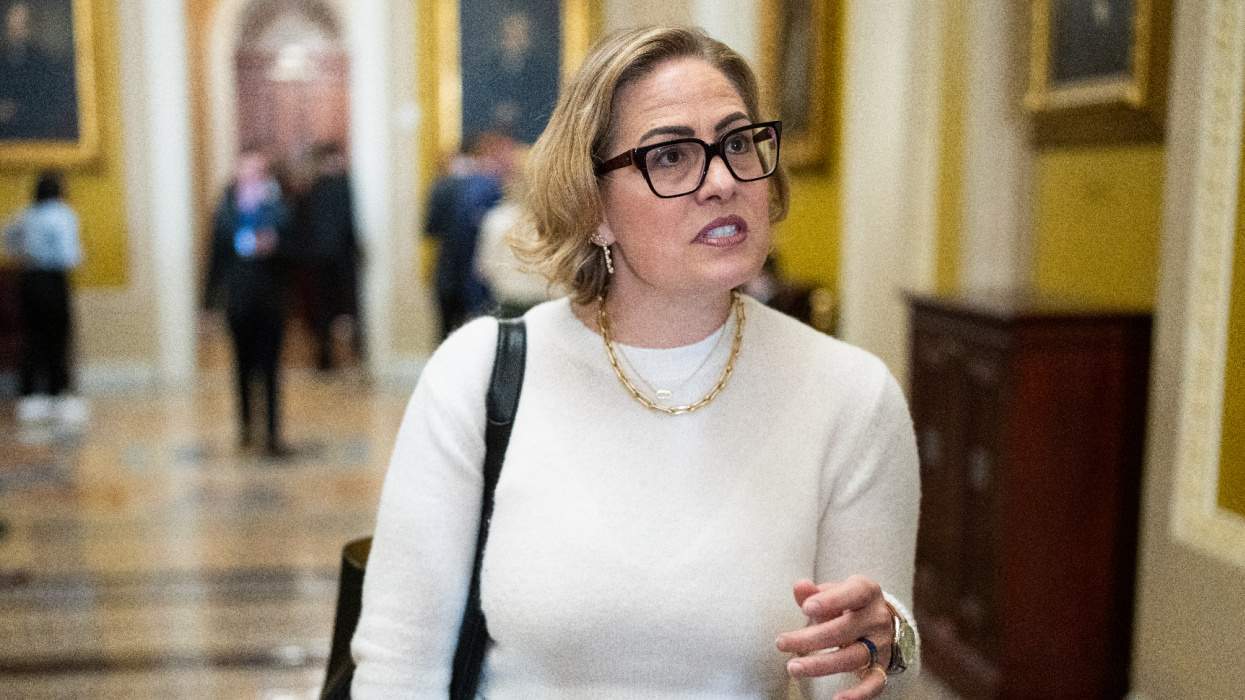March is Women's History Month, and with Donald Trump and his administration in power, there's never been a better time to honor all women. Throughout the month The Advocate will feature queer pioneers whose strength, resilience, and ingenuity paved the way for others.
Today we remember Mercedes De Acosta, a poet, playwright, screenwriter, novelist, and costume designer, who remains known chiefly as the lover of some of the most famous women of the 20th century: Greta Garbo, Marlene Dietrich, Isadora Duncan, Tallulah Bankhead, and more.
What she accomplished: De Acosta dabbled in several art forms, but her most impressive creation was herself -- a strong and original personality and an unabashedly out lesbian. "In a period of time that many people even doubted the reality of female orgasm, De Acosta was making women-on-women pleasure the smart, chic, and glamorous thing to do," wrote a colleague, Christopher Harrity, on one of our former sibling sites, Gay.net. "Her biography, with back-up documentation, proves that same-sex love was alive and well in a period of time when it could have been buried under the usual denial and subterfuge." She also had great personal style, cutting a dashing figure with her arresting profile, her short, slicked-back hair, and her usual garb of tricorn hat and cape. She famously boasted, "I can get any woman from a man."
De Acosta was born in 1893 in New York City to wealthy Spanish-emigre parents (by way of Cuba, in the case of her father). She and her family moved in high society, often entertaining neighbors that included former President Theodore Roosevelt and members of the Vanderbilt family. The youngest of eight siblings, she reportedly thought she was a boy until the age of 7, and her parents encouraged this perception, dressing her in boys' clothing and letting her participate in activities largely reserved for males at the time. She realized she was not a boy when a playmate exposed his penis to her. Her parents then tried to make her more feminine, a process that involved sending her to a convent school, from which she ran away. "I am not a boy and I am not a girl, or maybe I am both -- I don't know," she told the nuns, according to Hugh Vickers, author of Loving Garbo: The Story of Greta Garbo, Cecil Beaton, and Mercedes de Acosta. "And because I don't know, I will never fit in anywhere and I will be lonely all my life."
She fought this loneliness, however, with a series of love affairs. In the 1910s and '20s in New York, she had romances with Russian actress Alla Nazimova, dancer Isadora Duncan, and famed stage actress Eva Le Gallienne, who inspired her to write plays. All told, De Costa wrote nearly a dozen plays, plus three volumes of poetry and a novel, but only four of her plays were ever produced. One of the better-received ones was Jacob Slovak, which dealt with anti-Semitism; it impressed critics when it ran on Broadway in 1927, with The New York Times calling it "honest and interesting." Some of her plays had coded gay references, but De Acosta believed the primary barrier she faced was that critics thought her a wealthy dilettante and didn't take her work seriously.
She went to Hollywood in the 1930s and there met her great love, Garbo. De Acosta and the reclusive star had much in common, including a love of the outdoors, as demonstrated by an idyllic vacation they enjoyed at a lake in California's Sierra Nevada mountains. De Acosta took a house next door to Garbo's in Los Angeles's Brentwood section and began working on a screenplay that would have the beautiful actress dressed as a boy for much of the film. MGM executive Irving Thalberg put a stop to the project, saying, "We have been building Garbo up for years as a great glamorous actress, and now you come along and try to put her in pants and make a monkey out of her." De Acosta and the elusive Garbo would have an off-and-on relationship for more than a decade, but De Acosta found solace with other women, including Marlene Dietrich, whom she described in a poem as "the essence of the stars and the moon and the mystery of the night." Also among De Acosta's lovers were actresses Katharine Cornell, Tallulah Bankhead, and Ona Munson (Belle Watling, the madam, in Gone With the Wind), and dancer Adele Astaire (Fred's sister).
De Acosta published her autobiography, Here Lies the Heart, in 1960. Although it contained no direct references to her same-sex romances, several of the women mentioned as "friends" felt they had been outed. Garbo snubbed her in public and never spoke to her again, and Le Gallienne referred to the book as "Here the Heart Lies and Lies and Lies." Although she was in poor health for much of the 1960s, De Acosta retained a zest for living and made new friends, among them Andy Warhol. She died in New York in 1968, "in relative poverty and obscurity," as Harrity noted. Since then, scholars of LGBT history have made sure she's obscure no longer.
Choice quote: "To the outward form of sex which the body has assumed, I have remained indifferent. I do not understand the difference between a man and a woman, and believing only in the eternal value of love, I cannot understand these so-called 'normal' people who believe that a man should love only a woman, and a woman love only a man. If this were so, then it disregards completely the spirit, the personality, and the mind, and stresses all the importance of love to the physical body." -- De Acosta, as quoted by Vickers in Loving Garbo
For more information: Vickers's book was published in the 1990s, but used copies are available on Amazon.com and elsewhere, and there's an excerpt online, via London newspaper The Independent. The first full biography of De Acosta, That Furious Lesbian: The Story of Mercedes de Acosta by Robert A. Schanke, was published in 2004 and is still in print. Robert Schanke edited a volume of her plays, Women in Turmoil: Six Plays by Mercedes de Acosta, and maintains a website with extensive information on her. De Acosta is also the subject of the play Garbo's Cuban Lover by lesbian playwright Odalys Nanin; it was first produced in 2001 and has had several successful revivals.














Charlie Kirk DID say stoning gay people was the 'perfect law' — and these other heinous quotes
These are some of his worst comments about LGBTQ+ people made by Charlie Kirk.